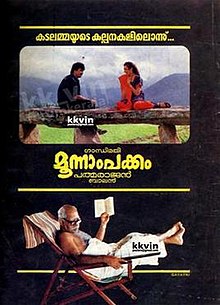Moonnam Pakkam
| Moonnam Pakkam | |
|---|---|
 | |
| Directed by | Padmarajan |
| Written by | Padmarajan |
| Produced by | Balan |
| Starring | Thilakan Jayaram Kirti Singh Jagathi Sreekumar Rahman Ashokan Ajayan Surasu |
| Cinematography | Venu |
| Edited by | B. Lenin |
| Music by | Ilaiyaraaja |
Production company | Gandhimathi Films |
| Distributed by | Gandhimathi Films |
Release date |
|
| Country | India |
| Language | Malayalam |
Moonnam Pakkam (English: The Third Day) is a 1988 Indian Malayalam-language drama film written and directed by Padmarajan. It stars Thilakan and Jayaram in the lead roles along with Kirti Singh, Jagathi Sreekumar, Rahman, Ashokan, Ajayan and Surasu in supporting roles.[1][2] Kirti and Ajayan made their debut in this film. The film was a commercial success. Thilakan's performance in the film is considered one of his most memorable performances.[3][4]
Plot[edit]
Thampi, who retired as an accountant from the Indian Railway in the mid-1980s following his son's death, leads a solitary life in his ancestral house. Thampi's grandson Bhasker, also known as Bhasi or Pachu, is pursuing his medical studies in Bangalore. Thampi is excited when Bhasi comes along with his friends Lopez, Ranjith Menon, and Krishnankutty to spend his vacation with grandpa. Their presence brings joy and happiness into Thampi's house. Bhasi is engaged to a girl named Bhadra, who happens to be the granddaughter of Thampi's friend, a doctor.
During the vacation, Bhasi and his friends often go to the nearby beach for a swim. During one such visit, Bhasi and Lopez are pulled into the ocean, and only Lopez manages to escape. The police and the locals conduct a rescue operation in the ocean but in vain. It is believed among the locals that whatever is taken by the ocean is returned on the third day, as meant by the title of the movie.
Thampi refuses to acknowledge the fact that Bhasi is dead and puts on a brave face, consoling Bhasi's mother, his friends, and Bhadra. Eventually, Bhasi's body is found on the third day. The funeral is held on the same day, and Bhasi's friends get ready to leave the day after. They all visit the beach one last time to say goodbye to Bhasi, where they see Thampi arriving with priests to perform the funeral rites of Bhasi.
While performing the "bali," Thampi, who had lost all hope, takes the rice ball, "balichoru," in his hands and proceeds to the sea. To everyone's shock, Thampi, along with the "balichoru," submits himself to the sea and commits suicide.
Cast[edit]
- Thilakan as Thampi
- Jayaram as Bhasi
- Kirti Singh as Bhadra
- Rahman as Lopez
- Ashokan as Ranjith Menon
- Ajayan as Krishnankutty
- Jagathi Sreekumar as Kavala
- Surasu as Doctor
- Soman as Kurup
- Jayabharathi as Bhanu
- Venu Nagavally as Jayan
Production[edit]
Major portions of the film were shot in Kanyakumari and its surrounding areas. The locations include Colachel, where the ancestral house is set, and Vatta Kottai, where the fort scene and the song "Thamarakkili" were filmed. The film's art direction was handled by Kurian Sabarigiri, makeup was done by Mohandas, and Indrans designed the costumes. Surya Jones worked as the film's still photographer. Malayalam playwright Surasu played a significant role in the film as Thampi's closest friend and Bhadra's grandfather. Another playwright, Jagathy N. K. Achary, made a cameo appearance as one of Thampi's friends in the film.[5]
Soundtrack[edit]
All lyrics are written by Sreekumaran Thampi; all music is composed by Ilaiyaraaja
| No. | Title | Artist(s) | Length |
|---|---|---|---|
| 1. | "Niramaala ( Unarumee Gaanam )" (Pathos) | G. Venugopal | |
| 2. | "Thaamarakkili Paadunnu" | K. S. Chithra, M. G. Sreekumar, Ilaiyaraaja | |
| 3. | "Unarumee Gaanam" | G. Venugopal, Chorus |
G. Venugopal won the Kerala State Film Award for Best Singer for the song "Unarumee Gaanam".
Reception[edit]
In 2019, Aradhya Kurup of The News Minute wrote, " It's a breezy watch till a few scenes before climax. But after that you witness one of the most traumatic climax scenes in Malayalam cinema. And Thilakan’s performance is such that you go through the whole rollercoaster ride with him."[4] The New Indian Express wrote, "A youthful Jayaram and versatile Thilakan produce a unforgettable display of love and affection between a widower and his grandchild. Thilakan's Thampi is as good as his Kochuvava from Kattukuthira (1990) or Achuthan Nair from Kireedam (1989) and Chenkol (1993), establishing his contendership for the best actor ever in Malayalam."[7]
References[edit]
- ^ "Moonnaampakkam". www.malayalachalachithram.com. Retrieved 24 October 2014.
- ^ "Moonnaampakkam". spicyonion.com. Retrieved 24 October 2014.
- ^ "'മുത്തച്ഛന്റെ ഒന്നാം പക്കം'". ManoramaOnline (in Malayalam). Retrieved 19 September 2022.
- ^ a b "'Kireedom' to 'Akashadoothu': Ten Malayalam tragedies that dried up my tears". The News Minute. 24 February 2019. Retrieved 6 July 2021.
- ^ "'പാർവതി മതം മാറണം, അതു നിർബന്ധമായി ചെയ്യണം': അന്നു പി.സി ജോർജ്ജ് സാറിനെ വിളിച്ചു പപ്പ". Vanitha. 11 July 2022. Retrieved 21 March 2023.
- ^ "മൂന്നാം പക്കം (1988)". malayalasangeetham.info. Retrieved 24 October 2014.
- ^ "Vineyards of passion and bloody beaches: 5 eternal Padmarajan films for movie buffs". The New Indian Express. Retrieved 19 February 2023.
